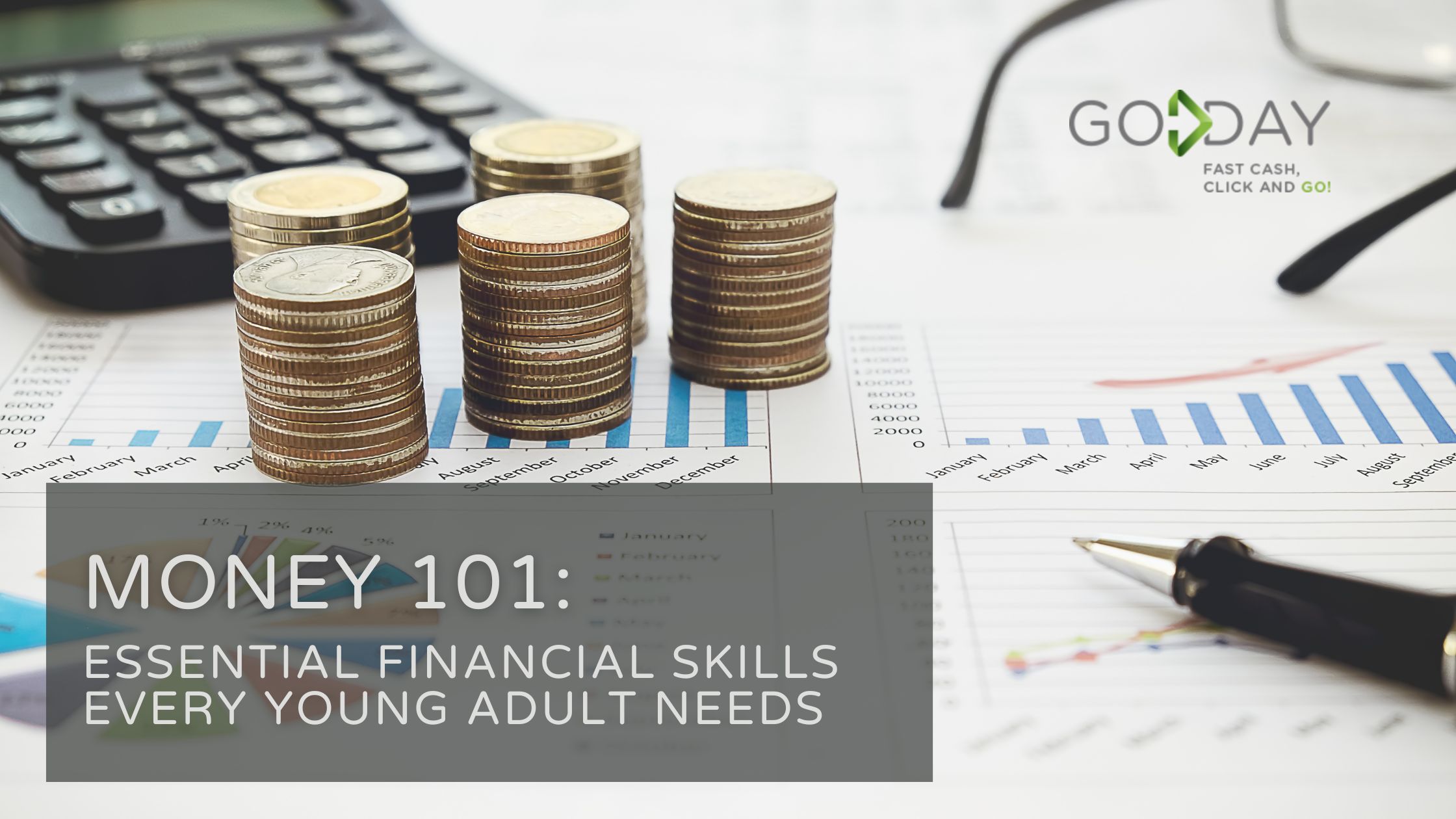
If there’s one life skill that should be taught before you ever sign a lease or swipe a debit card, it’s this: how to manage your money.
At GoDay, we’ve seen firsthand how financial stress can weigh you down. But we’ve also seen how empowering it is when someone starts to truly understand and take control of their finances. That’s why we’re writing this, not to throw a list of to-dos at you, but to guide you toward building a strong financial foundation from the ground up.
Whether you’re fresh out of high school, halfway through university, or just starting your first full-time job, this is for you.
Why Early Financial Literacy Sets the Tone
Your early 20s are when a lot of habits take root. That includes how you spend, save, borrow, and plan. Getting it right during this phase doesn’t mean you’ll never make a financial mistake, but it gives you the tools to recover quicker and build more confidently.
Financial literacy is still sorely lacking among Canadians, making it crucial to tackle the issue at a younger age. A survey found that only 3% of Canadians could define six common banking acronyms, including TFSA, RSP, GIC, ETF, ESG, and ROI. Most were surprised by their results, revealing a gap between perceived and actual financial literacy.
Improving financial literacy and education is vital not only for avoiding financial hardship, but also for achieving financial freedom and long-term well-being. Without it, simple things like understanding your account balance or planning for income taxes can feel overwhelming. But with it, you’re equipped to build true financial wealth and secure your financial future.
Influence of Family and Education: The Foundation Beneath the Numbers
Our earliest lessons about money rarely come from textbooks. More often, they come from watching our parents, guardians, or mentors navigate their own financial decisions. For better or worse, your upbringing influences how you view spending, saving, and planning for the future.
If you grew up with financial role models who talked openly about budgeting or retirement planning, you likely entered adulthood with a head start. But if those conversations were absent, or filled with stress, it’s natural to feel unprepared.
That’s why financial education in schools and communities is so critical. Programs that cover money management, income taxes, and saving strategies can fill in the gaps and help level the playing field. If your background didn’t include helpful financial advice, it’s never too late to become your own expert.
Financial literacy isn’t just about knowing the difference between credit and debit. It’s about building the confidence to plan for your financial future, avoid unnecessary hardship, and create the life you want.
Budgeting Basics: Where Every Financial Strategy Begins
Know What’s Coming In and What’s Going Out
Budgeting isn’t about limiting your lifestyle it’s about creating one that actually works. You can’t build wealth if you don’t know where your money’s going. The first step is tracking your income and expenses. Every dollar. That $4 coffee? It counts.
A lack of budgeting is one of the reasons Canadians face record-low savings rates. Data from the 2019 Canadian Financial Capability Survey (CFCS) underscores the impact of budgeting on financial stability. The data reveals that Canadians who actively budget are about half as likely to fall behind on their financial obligations compared to those who don’t (8% vs. 16%).
Budgeting clearly contributes to improved money management. In fact, the number of Canadians with a budget increased from 46% in 2014 to 49% in 2019. Yet, approximately 1 in 6 Canadians (about 17%), continue to struggle with managing their money and could significantly benefit from creating a budget.
Using reliable budgeting apps makes tracking painless. They help you stay consistent and self-aware, and they’re perfect for young adults learning to manage their money.
You might also explore interactive tools like financial calculators or digital expense tracker tools to visualize where your money goes each month. These small steps shift your relationship with money and are proven to build healthier long-term spending habits.
Use a Flexible Framework That Works
Start with the 50/30/20 rule. Allocate 50% of your income to needs, 30% to wants, and 20% to savings or debt repayment. It’s simple, flexible, and gives structure without micromanagement. If your needs are eating up more than half your income, look at ways to adjust and rebalance over time.
You can also explore financial education platforms like Schwab MoneyWise or Bankrate for budgeting templates and money management practices that are easy to implement.
Understanding Credit: Building a Strong Credit History
Your credit history is more than just a number; it’s your financial reputation. It impacts your ability to rent, get approved for a loan, or even land a job.
And yet, younger Canadians are struggling here. A 2024 CTV News article mentioned data from Equifax Canada which revealed that the delinquency rate for those under 35 rose over 18% in 2023.
Build Your Credit Thoughtfully
Start by paying bills on time, every time. Keep your credit card balances low—ideally under 30% of your limit, and don’t apply for unnecessary new credit. If you’re new to credit, consider a secured card or becoming an authorized user on someone else’s account.
Understanding the basics of credit management helps you avoid financial fraud and preserve your financial health. Tools like credit monitoring and real-time account monitoring, offered through most online banking platforms, can give you added visibility and security.
Learning to use credit responsibly lays the groundwork for future opportunities, whether it’s renting an apartment or getting a personal loan with favorable terms.
Saving and Investing: Securing Your Financial Future
Start With a Safety Net
Before you dive into the stock market, build an emergency fund. This is your buffer against the unexpected—medical bills, car trouble, job loss. Aim for 3-6 months of essential expenses, and keep it in a high-yield savings account that’s easy to access.
Get Comfortable With Investing
Once you have your emergency fund, start investing. Begin with small amounts in a TFSA or RRSP. Use platforms like Wealthsimple or Questrade for easy, low-fee investing. Focus on index funds or ETFs, and don’t worry about timing the market.
This is where learning about online loans and investment tools can help. The goal isn’t to gamble; it’s to grow your wealth steadily over time.
If you’re working a full-time job, ask your employer if they offer an employer-sponsored retirement account like a 401(k) equivalent. Start contributing as early as possible, even if it’s a small amount. Compounding interest does most of the heavy lifting over time.
Managing Debt: Know the Difference Between Good and Bad Debt
Not all debt is created equal– good and bad debt can be separated by one thing: return on investment. Student loans or mortgages can lead to greater financial opportunity. Maxed-out credit cards? Not so much.
By the end of 2024, Canadians carried a total of $2.56 trillion in consumer debt, marking a 4.6% rise compared to the previous year.
Strategies for Taking Control
Start by listing your debts, interest rates, and payment amounts. Choose a strategy: the snowball method (smallest debts first) or the avalanche method (highest interest rate first). Automate where you can.
If you’re overwhelmed, consider consolidating. Getting a personal loan with a fixed rate can simplify repayment and lower your overall interest.
Also, understand how to use flexible borrowing options available to you responsibly. Lines of credit and short-term loans have a place, but only if you have a plan to repay them.

Make Your Goals Work for You
Having money without direction is like having a car with no destination. You need smart financial goals that align with where you want your life to go.
Whether it’s saving $5,000 for travel, investing in a course, or buying your first car, goals should be specific, measurable, achievable, relevant, and time-bound. Break them into milestones and track your progress monthly.
Smart financial goals don’t just keep you disciplined, they keep you motivated.
If you didn’t grow up with strong financial role models or access to financial advice, don’t let that stop you. Leverage modern financial education platforms and tools, financial literacy programs offered by the Government of Canada, to get the clarity you need.
Use Tech to Manage Your Money Like a Pro
Your phone can distract you or it can empower you. Budgeting apps like Mint, YNAB, and PocketGuard give you a full view of your spending and help you stay intentional.
Financial technology (fintech) has completely changed the game for young adults. Money management apps now come with automated transfers, credit tracking, and investment tools—all from your phone. Whether you prefer digital tools or traditional money management techniques, the options have never been more accessible.
These tools go beyond reminders. They help you analyze patterns, set limits, and shift habits. Whether you’re tracking spending or saving for a down payment, apps make financial clarity easier.
Know Your Options: Types of Loans That Fit Your Needs
There are many types of loans out there, including personal loans, student loans, payday loans, lines of credit. Each has its place, but not all are created equal.
Understanding which type of loan fits your situation is key. A short-term payday loan can bridge a gap in an emergency. A personal loan can help you consolidate debt. The more informed you are, the better decisions you can make.
Start Where You Are
At GoDay, we believe managing your money isn’t about having it all figured out—it’s about staying curious, staying consistent, and building habits that move you forward.
Whether you’re budgeting, investing, paying off credit card debt, or exploring your borrowing options, every small step adds up.
And when life throws a curveball? We’re here. GoDay offers fast, transparent financial support when you need it most—with tools designed to help you make informed choices, not desperate ones.
Because your financial future doesn’t need to be overwhelming, it just needs to start.
Need more tips on how to manage your money or explore flexible borrowing options?
Check out our full blog library or contact our friendly customer service team for more information.


